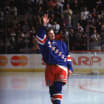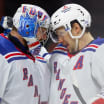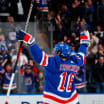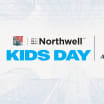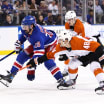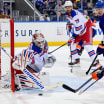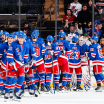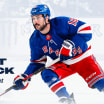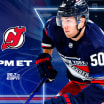Being a Ranger with Steve Valiquette
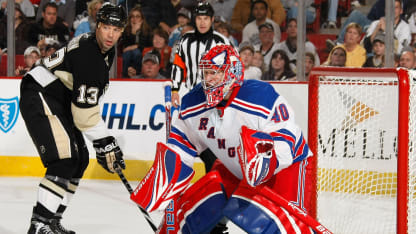
What made you decide to start playing hockey?
My dad's cousin is Jack Valiquette. Jack was a first round pick of the Toronto Maple Leafs. My grandfather was a scout for the Toronto Maple Leafs, my dad was a hockey player, so you can say Hockey is in my family's blood and I was born to play.
At what point did you realize you wanted to be a goalie? What drew you to the position?
I did not want to be a goaltender, at all. Nobody in my family wanted me to be a goaltender. In fact, when my parents were on vacation I had to get my babysitter to forge the permission slip to allow me to play. I was playing house league at the time and I was cut in consecutive seasons from the Bolton Bruins single A travel team as a left winger. I remember not being discouraged, just that I would do anything possible to make the team, so I became a goalie. I was cut from the team as a goalie as well the next season and then finally made the team after three unsuccessful tries. In the end, I loved the position, I love the sport deeply and I think that is why I was able to make it a career. I was cut seven years in a row after unsuccessful NHL training camps and sent to the minors I still always believed I was going to play in the league.
What were some obstacles you faced on your way to the NHL and how did you overcome them?
Perseverance and discipline are the two words that first come to mind. It's very difficult to believe in yourself when year after year you don't achieve your dream (making an NHL team), but I was still willing to sacrifice everything I had to invest in myself. I had to give up daily comfort for a future that was uncertain at times. The discipline to get sufficient rest, nutrition, hydration, training and be very selfish with my time to not overextend myself that was the tough stuff. That's what is necessary to be a hockey player and things you just have to get done. But, if you want to be a hockey player you are willing to make those sacrifice to achieve your goals. I believed the game was in my blood, so I always found those sacrifices relatively easy. When I look back at it, I laugh at my teenage years. I left home when I was 15 and I attended 8 different high schools as I played junior hockey away from home. When I retired at age 35 that was the first time I spent 12 calendar months in one place in my life.
What was your biggest motivation in your journey to the NHL?
My biggest motivation is a weird one. I was drafted in the eighth round by the Los Angeles Kings in 1996 and that was the worst day of my life. I swore that day that I was going to outplay all 20 goaltenders that were drafted before me. I wrote the list of goaltenders down in my book and one by one after they retired during the years afterwards I would cross them off my list. I wanted to outplay them all in terms of career years . My motivation, as bizarre as it sounds was to outplay every goalie that was drafted before me in 1996. After my final season in Europe at age 35 I waited for the last goalie on my list to sign his contract for the following season. Mathieu Garon signed a one-year contract in Italy, so I signed a two-year contract in Sweden with Djurgarden to beat him out. Unfortunately, a few months later I had to resign to my childish ways and I gave the contract back because my heart was no longer in the training and preparation that I needed to do to be at my best. My wife and I had our second child, we had just bought our dream house on the beach and I just knew it was time. It was time to no longer be selfish. It was time for my family.
What was the most valuable lesson you learned as a New York Ranger?
I learned the three most valuable lessons in player development when I was a New York Ranger:
1. Be Coachable. Benoit Allaire developed me in the AHL into an NHL goaltender because I could take his teachings and apply it to my on ice game. Jim Schoenfeld was our general manager in the AHL and I was able to take his coaching and enhance my life off of the ice to be a better pro.
2. Try Your Hardest. This seems like it could be simple and that couldn't be further from the truth. Most people that I've met in my lifetime don't have a clue about what this means. If you want to be a Ranger you will learn in the minor leagues what this is all about. Learning how to not put limitations on yourself mentally and pushing yourself physically through the wall every single day and make every repetition count that is the valuable lesson that you learn as you become a New York Ranger.
3. Never Get Frustrated. When the game doesn't go your way or when your coach is trying to teach you something new and you get frustrated, well development just stopped dead in its tracks. There is no room for frustration in this game. You will fail you will fall you will struggle you will reach you will fail and fall again and then you will succeed….that is what development looks like.

